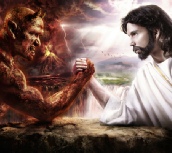



 NEXT
NEXT
 BACK
BACK
 Forum
Forum


Philosophical musings on Quanta & Qualia; Materialism & Spiritualism; Science & Religion; Pragmatism & Idealism, etc.




Post 111. October 12, 2020 continued . . . .
The Probability of God
Symmetry of Good vs Evil
One inherent problem with Bayesian probability is the necessity to assign numerical values to degrees of belief. This is where personal bias is most evident. Nevertheless, Unwin feels that his conservative approach should minimize any pro-
I won’t go through his belief scale point by point, but I will comment on The Recognition of Goodness. Unwin asks, “in a godless universe, would goodness have meaning?” He notes that his God’s infinite values would create an “asymmetry between good and evil” But I prefer to think that Good versus Evil in reality is a result of the dynamically balanced symmetry7 of dualism and relativity. In God’s infinite realm, all is One. But I imagine that, in the process of world-
However, once human minds are on the scene, distinctions between positive and negative change are now evaluated as Good or Evil, from the selfish perspective of the observer. As Darwin observed for organisms, any physical change may allow or deny further development (life or death). So, our world is inherently dualistic, but still remains close to a symmetrical balance8. Hence, not completely Good or Evil, but a dynamically balanced opposition. Therefore, human choices can swing the equilibrium one way or the other. Thus, allowing collective freedom of will to influence the course of history. This human-
Since the world seems to be inherently balanced between events that are good for humans, and those that are bad, we are fortunate that evolution has instilled in us, a moral sense, that can distinguish between the poles of Fortune. Unwin seems to attribute that human knowledge of Good & Evil to a trait of the supernatural soul, rather than an adaptive evolution-
Post 111 continued . . . click Next
Evil vs Good
9. Hegelian Dialectic :
The course of human history is determined by a delicate balance between positive progressive change, and negative conservative opposition. This conflict results in ups & downs, but the general trajectory of history continues to move forward, toward some unknown destiny.
http://blog-
Hegel claimed that spirit was “at war with itself”—“it has to overcome itself as its most formidable obstacle.” . . .
Thus, each phase of the historical process could be said to contain the seeds of its own destruction and to “negate” itself; the consequence was the emergence of a fresh society,
The notion that history conforms to a “dialectical” pattern, according to which contradictions generated at one level are overcome or transcended at the next . . .
7-
Astrologers have found, in the cosmic microwave background, that the mass & energy of the universe is almost perfectly symmetrical in all directions. But there remains a slight asymmetry, an imbalance, which allows some room for positive change and progress.
In Roman philosopher, Lucretius’, 50 BC hymn to materialism, he introduced the notion of “The Swerve”, a mysterious random force, akin to the modern concept of randomness, which slightly altered the deterministic straightline trajectories of atoms in the void, in order to break the deadlock of perfect symmetry. Thus, allowing novelty & change into an otherwise static world.
Cosmologists have determined that the overall shape of the universe is almost, but not quite, Flat. Meaning that it is finite, but unbounded.
“ It is shown that the Universe as a whole cannot possess perfect symmetry and that there was no cosmic symmetry breaking at cosmic phase transitions between cosmological eras. Cosmo-
https://link.springer.com/article/10.1007/BF00672858



The Probability of God
A Simple Calculation
That Proves the
Ultimate Truth
Steven D. Unwin
Physicist, Risk Management
“Since the existence of God is the ultimate uncertainty, and probabilistic analysis is the means of addressing uncertainties . . .
The probability of God
begs to be computed ”